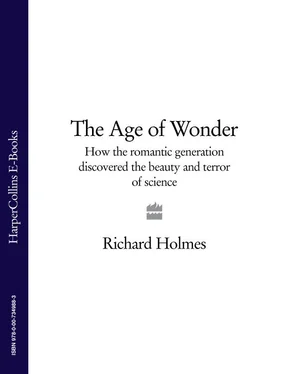The marines did return, to everyone’s huge relief, at eight o’clock that morning, and Banks watched carefully through his telescope as they were hauled aboard the Endeavour while the hostages were released in exchange. Once he saw they were all ‘safe and sound’ he discharged his own Tahitian ‘prisoners’ from his tent, ‘making each such a present as we though[t] would please them with which some were well content’. 55 Though he does not mention it, this may also have been his last chance to spend a night with Otheothea.
The Endeavour finally hoisted anchor early on the morning of 13 July 1769. ‘After a stay of 3 months we left our beloved Islanders with much regret,’ reported Banks, with careful understatement. 56 The whole of Matavi Bay was full of Tahitian canoes. Oborea and Otheothea came aboard briefly to say tearful farewells. Banks and Tupia then climbed the rigging and stood together in the crow’s nest, waving. Sydney Parkinson wrote: ‘On our leaving the shore the people in the canoes set up their woeful cry- Awai! Awai! -and the young women wept very much. Some of the canoes came up to the side of the ship, while she was under sail, and brought us many cocoas.’ 57
Banks had gained a complicated impression of Paradise. As the Endeavour sailed westwards towards New Zealand throughout August 1769, with brief stops at other Polynesian islands (seventeen in all), he sat down in his sweltering cabin to put his reflections in some kind of order. The result was his long anthropological essay ‘On the Manners and Customs of the South Sea Islands’, perhaps the most original paper he ever wrote.
Tahiti was indeed a kind of Paradise: astonishingly beautiful, its people open and generous, and its way of life languid and voluptuous. But there were many darker elements: strong, even oppressive social hierarchies; endemic thieving; a strange religion haunted by ghosts and superstitions; infanticide; and warlike propensities just below the surface. Nonetheless, Banks’s essay is full of his glowing memories, which would later stand him in good stead on the bleakest moments of the journey home: ‘No country can boast such delightfull walks as this, the whole plains where the people live are coverd with groves of Breadfruit and cocoa nut trees without underwood; these are intersected in all directions by the paths which go from one house to the other, so the whole countrey is a shade than which nothing can be more gratefull in a climate where the sun has so powerfull an influence.’ 58
The essay is packed with technical information: Tahitian methods of cooking, boat-building, house-construction, tool-making, fishing, dancing, drum-making, navigation, weather-predicting, ceremonial dramas, tattooing (again). Banks also writes tenderly of shared meals, enchanting dresses and languid afternoons. His remarks on the innocence of Tahitian ornaments are characteristic: ‘Ornaments they have very few, they are very fond of earings but wear them only in one ear. When we came they had them of their own, made of Shell, stone, berries, red pease, and some small pearls which they wore 3 tied together; but our beads very quickly supplied their place; they also are very fond of flowers, especialy of the Cape Jasmine of which they have great plenty planted near their houses; these they stick into the holes of their ears, and into their hair, if they have enough of them which is but seldom. The men wear feathers often the tails of tropick birds stuck upright in their hair.’
There is a long passage on the beautiful cleanliness of the Tahitian body, both male and female. All Tahitians wash themselves at least three times a day in the rivers, making their skin smooth and glowing. Their teeth are dazzling white, and they remove all body hair. Banks even grew accustomed to the strange, unforgettable smell of their hair oil: ‘This is made of Cocoa nut oil in which some sweet woods or flowers are infusd; the oil is most commonly very rancid and consequently the wearers of it smell most disagreably, at first we found it so but very little use reconcild me at least very compleatly to it. These people are free from all smells of mortality and surely rancid as their oil is it must be preferrd to the odoriferous perfume of toes and armpits so frequent in Europe.’
The Tahitians’ simplicity and innocence (the question of theft aside) came out in innumerable ways, as for example in their attitude to alcohol: ‘Drink they have none but water and cocoa nut Juice, nor do they seem to have any method of Intoxication among them. Some there were who drank pretty freely of our liquors and in a few instances became very drunk but seemed far from pleased with their intoxication, the individuals afterwards shunning a repitition of it instead of greedily desiring it as most Indians are said to do.’ 59
The idea of sexual innocence proved more complicated for a European to accept: ‘All privacy is banishd even from those actions which the decency of Europaeans keep most secret: this no doubt is the reason why both sexes express the most indecent ideas in conversation without the least emotion; in this their language is very copious and they delight in such conversation beyond any other. Chastity indeed is but little valued especialy among the midling people; if a wife is found guilty of a breach of it her only punishment is a beating from her husband. Notwithstanding this some of the Eares or chiefs are I beleive perfectly virtuous.’
What later came to be regarded as the most scandalous of all Tahitian customs, the young women’s seductive courtship dance, or ‘ timorodee ’, Banks describes with calm detachment and a certain amused appreciation: ‘Besides this they dance, especially the young girls whenever they can collect 8 or 10 together, singing most indecent words using most indecent actions and setting their mouths askew in a most extrordinary manner, in the practise of which they are brought up from their earlyest childhood. In doing this they keep time to a surprizing nicety, I might almost say as true as any dancers I have seen in Europe, tho their time is certainly much more simple. This excercise is however left off as soon as they arrive at Years of maturity. For as soon as ever they have formed a connection with a man they are expected to leave of Dancing Timorodee-as it is called.’ 60
The only Tahitian practice that Banks found totally alien and repulsive was that of infanticide, which was used with regularity and without compunction as a form of birth control by couples who were not yet ready to support children. Banks could scarcely believe this, until he questioned several couples who freely admitted to destroying two or three children, showing not the slightest apparent guilt or regret. This was a different kind of innocence, one far harder to accept. Banks pursued the question, and found that the custom originated in the formation of communal groups in which sexual favours were freely exchanged between different partners: ‘They are calld Arreoy and have meetings among themselves where the men amuse themselves with wrestling &c. and the women with dancing the indecent dances before mentiond, in the course of which they give full liberty to their desires.’
He also found that the Arreoy, and the custom of infanticide, owed their existence ‘chiefly to the men’. ‘A Woman howsoever fond she may be of the name of Arreoy, and the liberty attending it before she conceives, generaly desires much to forfeit that title for the preservation of her child.’ But in this decision he thought that the women had not the smallest influence. ‘If she cannot find a man who will own it, she must of course destroy it; and if she can, with him alone it lies whether or not it shall be preserv’d.’ In that case both the man and the woman forfeited their place in the Arreoy, and the sexual freedoms associated with it. Moreover, the woman became known by the term ‘ Whannownow ’, or bearer of children. This was, as Banks indignantly exclaimed, ‘a title as disgracefull among these people, as it ought to be honourable in every good and well governd society’. 61
Читать дальше












